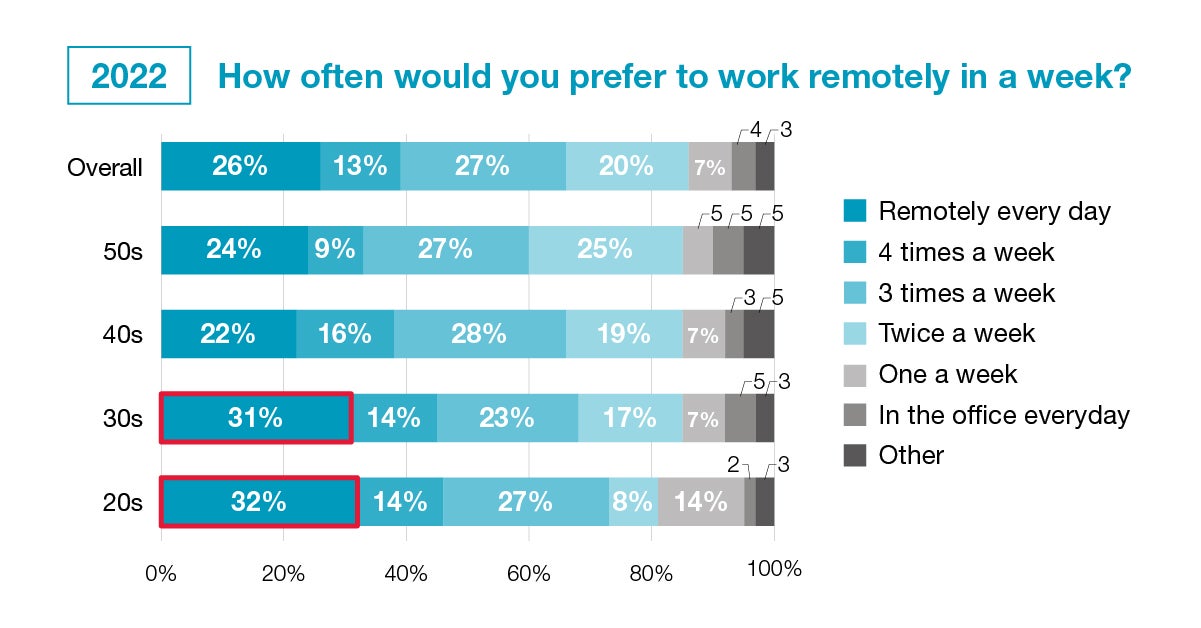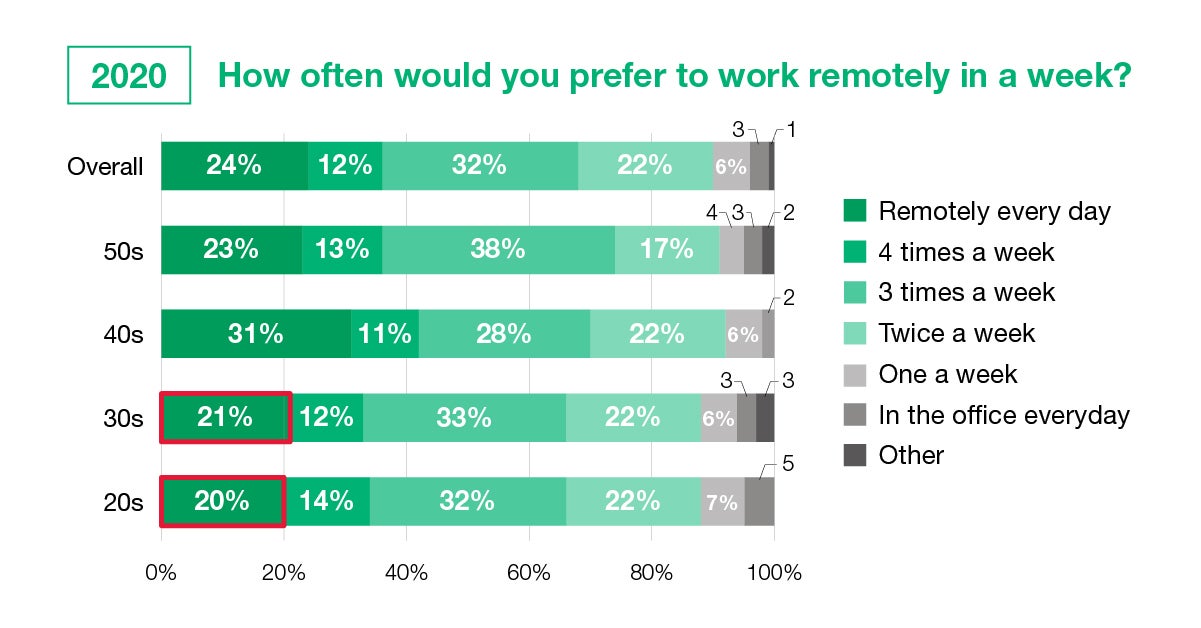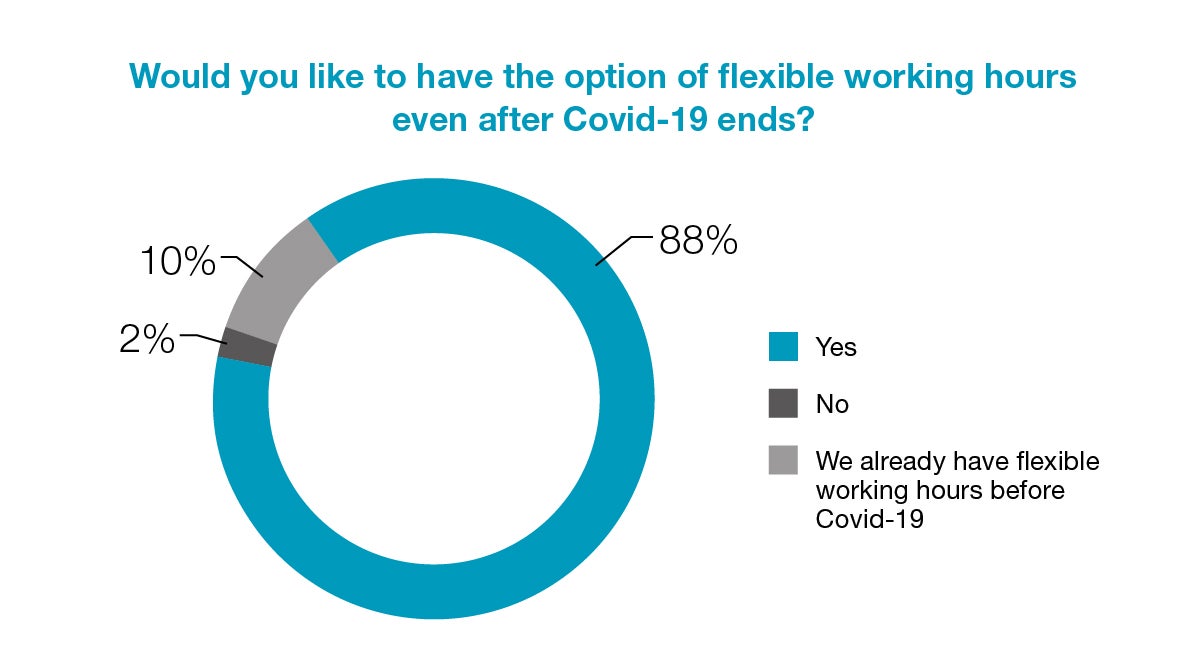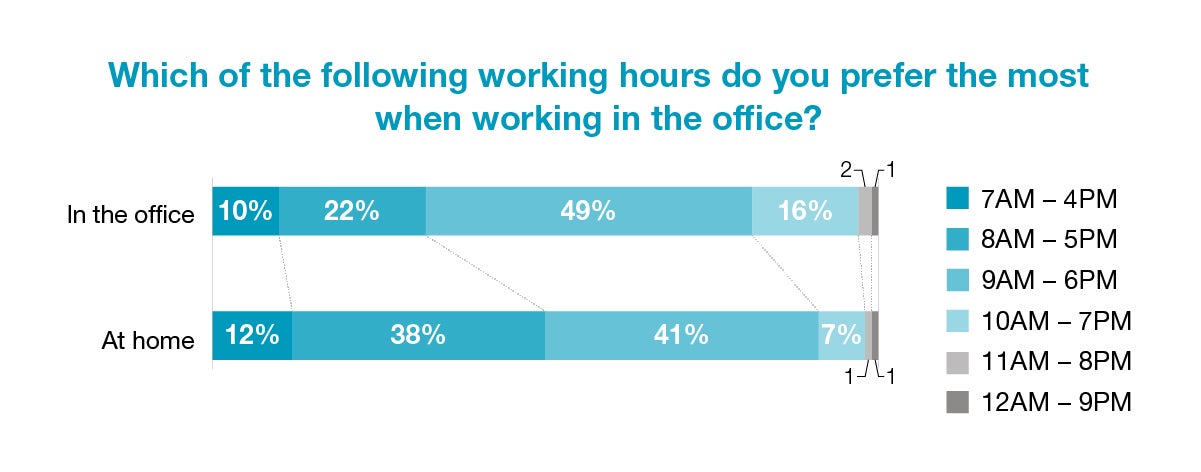Desired work style of employees: remote work “3 days a week” and “every day”
On 29 March, specialist professional recruitment firm Robert Walters Japan announced the results of a survey on post-COVID-19 work styles which was answered by 551 company employees in Japan. We first conducted a survey on post-pandemic work style preferences in 2020 and surveyed professionals in 2022 to observe whether preferences have shifted in the past two years.
Most employees prefer to work remotely “3 days a week” or “every day”
When 551 company employees who have worked from home for about two years throughout the pandemic were asked about their ideal frequency of remote work post-Covid, the most common response was “3 days a week” (27%), followed by “every day” (26%).
In particular, about 1 in 3 professionals in their 30s or younger wanted to work remotely every day. In our 2020 survey, only about 20% of company employees in the same age group expressed wanting to work remotely every day, suggesting that the younger generation are increasingly prioritising flexible working styles. Among employees in their 40s, about 30% responded that they wanted to work remotely every day in 2020. In comparison, the most common response was three days a week (28%) in 2022. We found that people in their 40s and 50s, who play a central role in businesses and are at the core of the workforce, want to incorporate remote work into their working styles in the post-Covid era.
Around 50% still prefer working 9 to 6 in the office
Eighty-eight percent of employees said they want flexible working hours to continue even after Covid-19 ends. Excluding the 10% who said they already had flexible work hours before the pandemic, only 2% responded that they would like to work set hours.
Regarding ideal work hours when working in the office, most respondents regardless of age or occupation would prefer to work from 9:00–18:00 (49%) or 8:00–17:00 (22%). As for ideal work hours at home, 41% prefer to work from 9:00–18:00 while 38% chose 8:00–17:00, indicating that employees are more likely to start work earlier in the office. On the other hand, only a few respondents, regardless of whether they work in an office or at home, prefer to work late into the night, which is reminiscent of the overtime hours of the past. The survey revealed that the total number of employees working from home who preferred working from 11:00–20:00 and 12:00–21:00 was less than 2%.
In response to the survey results, Shigeki Yaginuma, Marketing Director at Robert Walters Japan, commented: “During the past two years of living with Covid-19, many organisations have had a good opportunity to re-evaluate their work environment, working style and management methods. Employees have also taken this time to reflect on their values and priorities with more push for work-life balance. As hybrid working become more commonplace, improving and maintaining workforce productivity and efficiency will be a high priority for management. To remain competitive in the post-pandemic era, companies would benefit to continue offering more flexible working styles to maximise their employees’ performance and secure top talent.
(Survey period: 3-8 March 2022, Target: Company employees registered with Robert Walters Japan and living in Japan n=551)
About Robert Walters Japan:
Established in London, United Kingdom, in 1985, Robert Walters is a specialist recruitment consultancy with operations in 31 countries around the world. Robert Walters Japan established its Tokyo office in 2000 and Osaka office in 2007. For over 20 years, we've been a driving force in the Japanese bilingual recruitment market, providing high quality candidates for our clients and access to the best jobs. Our consultants are experts in their respective industries and work in teams to provide recruitment consultation services across a wide range of industries and job categories.
Related content
View AllIncreasingly complex working environments mean organisations want employees who are adaptable and resilient. But how can you spot these qualities in candidates? When hiring new talent, you might think technical prowess and interpersonal skills are all that matter. But in the stressful modern workpla
Read MoreFrom providing volunteering opportunities to offering tailored development training packages, there are plenty of non-financial ways to attract the best candidates. They say money makes the world go round, but for many candidates salary isn’t the only factor considered when accepting a job offer. Wh
Read MoreAssociate Professor Michael A. Osborne of the University of Oxford has predicted that 47% of the total jobs in the United States will face the risk of being automated by the year 2030. Many other pre-eminent, global executives have made similar statements, leading to these predictions being referred
Read More



